(外研版)小学英语五年级上册总复习
外研五年级上册重点知识点

外研五年级上册重点知识点外研版五年级上册的英语课程内容丰富,涵盖了多个方面的知识点,以下是一些重点知识点的总结:一、词汇学习1. 学习日常生活相关的词汇,如家庭成员、学校科目、日常活动等。
2. 掌握一些描述天气、季节的词汇,如sunny, rainy, spring, summer等。
3. 学习一些描述情绪和感觉的词汇,如happy, sad, excited, bored 等。
二、语法要点1. 现在进行时态的构成和用法,如am/is/are + 动词的现在分词形式。
2. 一般现在时态的构成和用法,特别是第三人称单数动词的变化规则。
3. 一般过去时态的构成,如动词的过去式形式,以及其在描述过去事件中的应用。
4. 形容词的比较级和最高级形式,如tall - taller - tallest。
三、句型结构1. 询问和描述人或事物的句型,如What's his name? He is talland strong.2. 表达喜好和不喜欢的句型,如I like/don't like swimming.3. 询问和回答时间、地点的句型,如What time is it? It's eighto'clock.四、听力理解1. 能够听懂简单的日常对话和短文,理解其大意。
2. 学会从听力材料中提取关键信息,如时间、地点、人物等。
五、口语表达1. 能够用英语进行自我介绍,描述自己的家庭、爱好等。
2. 学会用英语表达日常生活中的基本需求,如购物、问路等。
六、阅读理解1. 能够阅读并理解简单的英文故事、短文和图表。
2. 学会从阅读材料中找出主旨大意,以及回答相关问题。
七、写作技巧1. 学会写简单的英语日记,记录日常生活和感受。
2. 能够写信给朋友,表达问候和分享信息。
结语五年级的英语学习是一个重要的阶段,通过掌握这些重点知识点,学生可以为今后的英语学习打下坚实的基础。
希望每位学生都能在英语学习中取得进步,享受学习带来的乐趣。
外研版小学英语五年级上册优秀教案复习课程
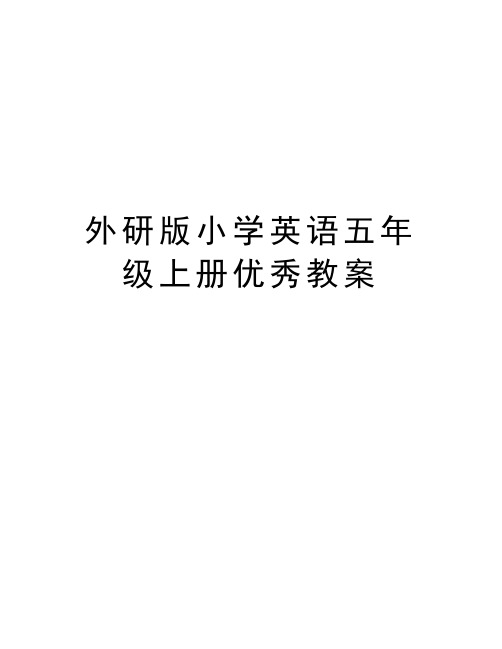
外研版小学英语五年级上册优秀教案Module 1Unit 1 Did you come back yesterday?Function: Talking about past activitiesTarget Language: When did you come back?We came back…Vocabulary: when, back, home, those, ice cream, with, finish, hurry up, wait for, dropProcedures:Step 1: Warm-up1. Say “Hello” to the pupils and ask them several questions.2. Review more verbs or verb phrases.Step 2 :Introduction1. Talk with the children about the summer vacation, such as: What did you do? What did you see? What did you eat? What did yo u drink? When did you come back? Etc.2. Tell the children that they are going to listen to the dialogues among Lingling, Sam and Amy and we are going to learn how to tal k about the past activities.Step 3: Presentation1. Put the chart on the blackboard and ask the children to look a t the picture carefully. Ask the children some questions: Do you kno w this place? Are Lingling, Sam and Amy in London or in China? T hey are in a park. They are in London.2. Point to John and tell the children that he is John. Now listen and look.3. Play the cassette and ask some questions.4. Teach the new words in different ways.5. Play the cassette again and pause after each utterance for the children to repeat.6. Practice in groups and act out the dialogue.Step 4: Finish a Task1. Suppose you are from another city and make a dialogue.2. Investigate the students who went out to tour during the sum mer vacation.Step 5: Homework1. Read the text in role.2. Introduce your own city.板书设计:课后反思:Module 1Unit 2 We bought ice creams?Function: Talking about past activitiesTarget Language: Did you…?Yes, I did. / No, I didn’t.Vocabulary: dear, met (meet), ran (run)Pronunciation: /i:/, /I/, /e/, / /Song: Where did you go?Procedures:Step 1: Warm-up1. Review verb phrases.2. Review Unit 1.Step 2: Introduction1. Prepare a postcard with a picture of own city and ask the chil dren:What’s this?What is the place?What can you see?2. Show the back of the postcard and tell the children that Lingl ing wrote a letter on it.Step 3: Presentation1. Play the cassette and pause after each utterance for the childr en to repeat and tick the actions: went to the park, met John, bought i ce creams, went home, ran to the bus, dropped.2. Play the cassette again and ask the children answer the follo wing questions: Who wrote the postcard? Whom did Lingling send t he postcard to?3. Write down the words: met, bought, went, ran, dropped and a sk the children to guess the original form.4. Finish activity 2.Ask the children to ask and answer in pairs.Step 4: Sing a song1. Ask the children to look at the pictures carefully.2. Play the cassette and ask the children to listen carefully.3. Teach the sentences of the song one by one.4. Play the cassette several times and ask the children to sing al ong.Step 5 :Homework1. Read the letter and sing the song.2. Finish activity 6: sentence relay.板书设计:课后反思:Module 2Unit 1 What did you buy?Function: Market shopping, talking about quantities of things Target Language: How much/many do you want?Do you like…Vocabulary: need, food, shopping list, cheese, how much, kilo Procedures:Step 1: Warm-up1. Sing the song of where did you go.2. Ask the students “what did you do yesterday?”Step 2: Introduction1. Tell the children: I went shopping yesterday. I went to Guang ming Street. I went to the supermarket. I bought lots of things. Wrot e down the word of supermarket on the blackboard and teach to read.2. Tell the children that Lingling and Ms Smart will go shopping. Today we are going to learn how to buy things in a supermarket in English.Step 3: Presentation1. Observe the pictures and ask them who they see and what the y are doing?2. Play the cassette and ask the children listen thoroughly. Ask t he children: Where are Ms Smart and Lingling? What need they buy ?3. Play the cassette the second time and ask the children to find out the food that Ms Smart buys.4. Ask the children to look at the list. This is a shopping list.5. Explain the usage of how many and how much.6. Play the cassette again and ask the children to imitate.Step 4: Finish a Task1. Ask the children to look at the shopping list and read the food and quantities correctly.2. Learn to buy things on computer.Step 5: Homework1. If condition permissions, the children can learn to go shopping on computer.2. Write a letter to your new pen friend, introducing yourself and your own hobbies and at the same time asking your new pen friend ’s likes.板书设计:课后反思:Module 2Unit 2 How much cheese did you want?Function: Write a shopping list in English and go shopping in EnglishTarget Language: How much…do you want?Vocabulary: juice, box, bottlePronunciation: / /, /a:/, / /, / /Song: How many do you want?Procedures:Step 1: Warm-up1. Make a dialogue with the students at random.2. Review Unit 1.Step 2: Introduction1. Talk about the season and ask the children what kind of outsi de activity they like.2. Talk about picnic. What should be prepared before picnic?3. Tell the children that we are going to write a shopping list fora picnic and we are going to continue to learn to go shopping in Eng lish.Step 3: Presentation1. Put the chart on the blackboard and ask the children some qu estions.2. Play the cassette the first time and ask the children to grasp t he text from the whole.3. Play the cassette the second time and ask the children try to r ead the sentences by themselves.4. Act out the dialogue in role. Choose one to make a record fin ishing the list.Step 4: Sing a song1. Ask the children to look at the pictures carefully.2. Play the cassette and ask the children to listen carefully.3. Teach the sentences of the song one by one.4. Play the cassette several times and ask the children to sing al ong.Step 5 :Homework1. Read the letter and sing the song.2. Finish activity 5: Use a spinner to finish the boxes板书设计:课后反思:Module 3Unit 1 Where did you go?.Function: Talking about past activitiesTarget Language: What did you do at the weekend?Where did you go?Vocabulary: the British Museum, the London Eye, wheel, won derful, understand, postcard, hour, mountainProcedures:Step 1: Warm-up1. Sing an English song.2. Ask the children: How many days are there in a week? What do you usually do at the weekend?Step 2: Introduction1. Ask the children to look at the calendar and ask: What day is it today?The teacher says: I had a busy weekend. Do you want to know what I did at the weekend?2. Ask Ss: where are Amy and Sam? Where did they go? They went to the park.Step 3: Presentation1. Put the chart on the blackboard and play the cassette let the c hildren listen carefully. The teacher asks several questions.2. Play the cassette the second time and let the children tick the new words and guess their meanings.3. Continue to explain the new languages.4. Play the cassette the third time and pause after each utterance for the children to repeat.Step 4: Finish a Task1. Finish activity 3.2. Investigate the students’ activities at the weekend and finish t he activity list.Step 5: Homework1. Listen to the tape of this unit.2. Encourage the children to write letters to their pen friends. W rite down the famous places and share with their friends.板书设计:课后反思:Module 3Unit 2 Daming took a photo of his father.Function: Talking about past activitiesTarget Language: Where/How/When/What did…?Vocabulary: hour, mountainPronunciation: /o /, /oo /, /u /, /u:/Song: the London EyeProcedures:Step 1 :Warm-up1. Make a dialogue with the students at random.2. Review Unit 1.Step 2: Introduction1. Talk about the dream. Last night I had a dream. In my dreamI went to the great Wall. And I met Daming and his father there. We are very happy.2. Say the Ss: Did Daming and his father do to the Great Wall? Let’s have a look.Step 3: Presentation1. Ask the Ss to look at the picture carefully and ask: What can you see?2. Play the cassette the first time and let the children to tick the new words and guess the meanings.3. Teach the new words in different ways.4. Play the cassette the second and pause after each utterance fo r the children to repeat.5. Ask the children to write a sentence on a piece of paper in gr oups and read them out.Step 4: Sing a song1. Ask the children to look at the pictures carefully.2. Play the cassette and ask the children to listen carefully.3. Teach the sentences of the song one by one.4. Play the cassette several times and ask the children to sing al ong.Step 5: Homework1. Read the text and sing the song.2. Finish activity 6: Play and say.板书设计:课后反思:Module 4Unit 1 Mum bought a new T-shirt for me.Function: Solving a dilemmaTarget Language: It’s mine/his/hers/yours.It’s Lingling’s...Vocabulary: mine, yours, argue, matter, wear, hers, his, line, cl ean, whoseProcedures:Step 1: Warm-up1. Sing an English song.2. Ask the children: How many days are there in a week? What do you usually do at the weekend?Step 2: Introduction1. The teacher shows the children something.2. Say to Ss: I’ve got something from the Lost-Found Room.May be something here is yours. If something is yours, what ca n you say to get it back? Let’s learn the text to find the answer.Step 3: Presentation1. Put the chart on the blackboard and play the cassette let the c hildren listen carefully. The teacher asks several questions.2. Play the cassette the second time and let the children tick the new words and guess their meanings.3. Continue to explain the new languages.4. Play the cassette the third time and pause after each utterance for the children to repeat.Step 4: Finish a Task1. Finish activity 5.2. Finish activity 6 in the whole class..Step 5: Homework1. Listen to the tape of this unit.2. Finish activity 4.Make a play in a group of three.板书设计:课后反思:Module4Unit2 What is the matter with Daming?教学目标:1、能听的懂、会说和会读单词matter、wear、took、What is the matter? That is OK、sports;2、步掌握名词性物主代词hers、 his、mine、 ours的用法3、初步掌握句型:Whose bag is this ?Is it Daming bag?Yes, it is his.4、歌曲欣赏教学重点:掌握名词性物主代词: hers、 his、mine、 ours的用法;掌握句型:What is the matter with Daming?He lost his bag.教学用具:录音机、磁带、单词卡片、实物等教学过程Step 1: Greatings and freetalk )问候和谈话。
外研版小学英语五年级上册知识点梳理

Module 1单词:met (meet的过去式)遇见above在 .... 上方,在.... 之上ground地面those那些ice cream 冰激凌us (宾格)我们finish吃完,喝完,用尽wait 等待,等候hurry赶紧,匆忙hurry up 赶紧,赶快dropped (drop 的过去式)(无意中)使掉落send 发送,寄email 电子邮件ran (run )的过去式跑love 爱你的短语:e back 回来e back from+某地从某地回来3.look at sb/sth 看某人/某物4.wait for sb 等候某人5.hurry up 赶紧,赶快6.by bus 乘公交车7.phone sb=call sb 给某人打电话8.动词过去式:go---wentsee---- saw buy---bought drop——dropped句子:1.— Did you come back yesterday —No,we came back last Sunday.2.Let ' s buy some.(Let '碗司原形我们做??????去吧。
)3.Wait for me.4.I dropped my ice cream.5.We bought ice cream.6.We went home by bus.语法:一般过去时1.动词过去式(动词+ed)规则:1)直接加-ed2) e结尾直接加-d3)变y为i加-ed4)双写加-ed2.不规则变化肯定句:Sb +动词ed.否定句:Sb +didn ' t+词原形.一般疑问句:Did+sb +动词原形Yes, sb did./ No, sb didn ' t.Module 2单词:list清单need需要first首先,第一;最先的,can 可以lost (lose的过去式)丢失any 一些,一点,若干use 使用bottle瓶子;一瓶的容量half 一半kilo千克短语:1.buy some fruit 买一些水果2.make a shopping list 制定一个购物活单3.how much多少(接不可数名词)4.half a kilo 半公斤5.over there 那边6.a lot of=lots of 许多的(接可数名词复数或不可数名词)7.also也(放句中)too也(放句末)8.some : 一些(接可数名词复数或不可数meet ----- m et come----came run-——ran名词,用在肯定句中)any:一些(接可数名词复数或不可数名词,用在否定句中)I have some apples.I don ' t haveny apples.Do you have any apples9.动词过去式:buy---bought eat---ate drink---drank句子:1.— What did you buy—I bought some apples.2.— How many bananas did you buy —Wedidn ' t buy any bananas.注:How many +可数名词复数+一般疑问句?3.— How much cheese did you buy —Half akilo.注:How much +不可数名词+ 一般疑问句?回答用half a kilo /数词+kilo(s) /数词+bottle(s)语法:I特殊疑问句构成:特殊疑问词+一般疑问句?回答时,根据具体情况回答。
M3U1课文知识复习+巩固练习-五年级英语上册(外研版三起)
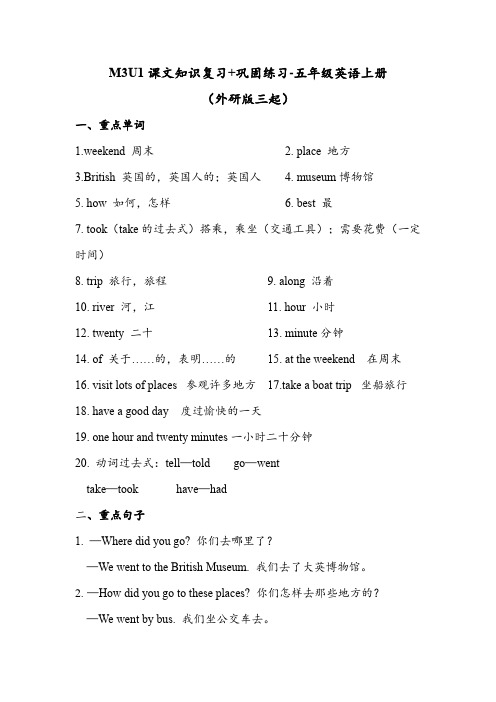
M3U1课文知识复习+巩固练习-五年级英语上册(外研版三起)一、重点单词1.weekend 周末2. place 地方3.British 英国的,英国人的;英国人4. museum博物馆5. how 如何,怎样6. best 最7. took(take的过去式)搭乘,乘坐(交通工具);需要花费(一定时间)8. trip 旅行,旅程9. along 沿着10. river 河,江11. hour 小时12. twenty 二十13. minute分钟14. of 关于……的,表明……的15. at the weekend在周末16. visit lots of places参观许多地方17.take a boat trip坐船旅行18. have a good day度过愉快的一天19. one hour and twenty minutes一小时二十分钟20. 动词过去式:tell—told go—wenttake—took have—had二、重点句子1. —Where did you go? 你们去哪里了?—We went to the British Museum. 我们去了大英博物馆。
2.—How did you go to these places? 你们怎样去那些地方的?—We went by bus. 我们坐公交车去。
3.What did you do at the weekend?周末你做了什么?巩固练习一、单选题()1. It took ________ one hour to clean the classroom.A.weB. ourC. us()2. —________?—We went to Sanya.A.How did you goB. Where did you goC. What did you see ()3. Amy likes singing ________.A.goodB. bestC. well()4. We went to school ________ bus yesterday.A.onB. byC. at()5. I want ________ to the US.A.goB. to goC. going()6. What did you do ______the weekend?A.atB. inC. to()7. We ______ to the London Eye.A.didn’t wentB. goesC. went()8. —_______ did you go there?—I went by bike.A.WhatB. WhereC. How()9. I didn't take ___ photos.A.manyB.anyC.much()10. We didn’t _______ the night sky yesterday.A.sawB. seeingC. see()11. We visited ______places.A.a lotB. lot ofC. lots of()12. Where did you go _______ Sunday?A.onB. inC. last()13. We went to _________ British Museum and _________ Big Ben.A.the; /B. a; theC. the; the()14. We ________ you a postcard last Saturday.A.sentB.sendsC.send()15. She liked the bus _____ best.A.rideB.ridesC.riding()16. We went to the zoo _________ bike last Sunday.A.takeB. byC. on()17. We took a walk _________ the river.A.onB. alongC. in()18. What did you do _________ the weekend?A.atB. fromC. in()19. We visited _________ places.A.a lots ofB. lot ofC. lots of()20. I liked the museum _________.A.bestB. veryC. good()21. —_________?—I’m fine, thanks.A.How are youB. How old are youC. What did you see二、词形转换三、用单词正确形式填空5. We (have) a good day last Sunday!四、补全句子1. What did you do at the w ?2. I went to the British M yesterday.3. Let’s take a boat t along the river.4. It t me an hour to get there yesterday.5. Did you s my watch? I can’t find it.五、选出与句意相符的图片。
[全]外研版(三起)小学英语五年级上册知识点归纳总结
![[全]外研版(三起)小学英语五年级上册知识点归纳总结](https://img.taocdn.com/s3/m/ce559d8e376baf1ffd4fad4a.png)
外研版(三起)小学英语五年级上册知识点归纳总结Module 1一、音标e——/iː/ Chinese, these,ea——/iː/ ear, please, teacheri——/ɪ/ it, listen, ill, sit, give, pig, bige——/e/ tell, then, pen, desk, pencil, net,a——/æ/ cat, apple, hat, bag, many, lap, value二、词汇met (meet的过去式) 碰上,遇见wait 等待,等候dropped (drop的过去式)(无意中)使掉落finish 吃完,喝完,用尽ran (run的过去式) 跑send 发送,寄ground(地面)ice cream(冰淇淋)email(电子邮件)above(在......上方,在......之上)those(那些)us(宾格)(我们)love(爱你的)三、固定搭配come back 回来hurry up 赶紧,赶快live in 住在go to the park 去公园go home 回家by bus 乘公共汽车wait for 等待last Sunday 上星期日四、句子1. How are you? 你好吗?2. I’m fine, thank you.我很好,谢谢你。
3. Come with us.跟我一起来吧。
4. Wait for me! 等等我!5. Thank you!谢谢你!五、重点句型1. 询问对方过去是否做过某事:Did you + 动词原形+ 其他?用Yes, I / we did.或者No, I / we didn’t.来回答。
eg:Did you go to school yesterday?你昨天上学了吗?Yes, I did.是的,昨天我上学了。
Did you see a film last night?你昨晚看电影了吗?No, we didn’t.不,我没看。
外研版(三起)小学五年级英语上册知识点梳理
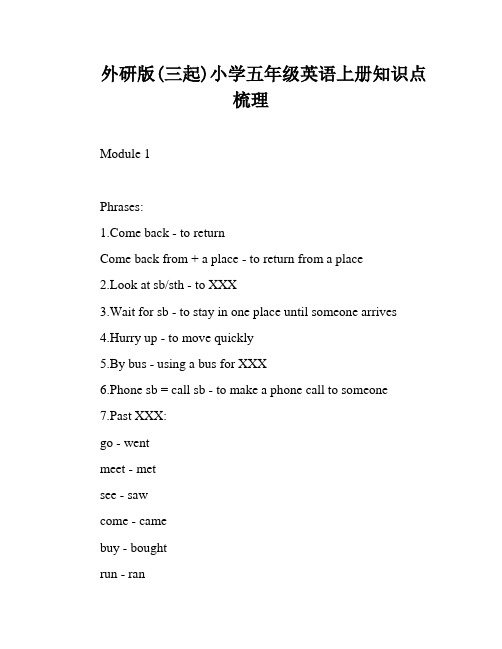
外研版(三起)小学五年级英语上册知识点梳理Module 1Phrases:e back - to returnCome back from + a place - to return from a place2.Look at sb/sth - to XXX3.Wait for sb - to stay in one place until someone arrives4.Hurry up - to move quickly5.By bus - using a bus for XXX6.Phone sb = call sb - to make a phone call to someone7.Past XXX:go - wentmeet - metsee - sawcome - camebuy - boughtrun - randrop - droppedXXX:1.Did you come back yesterday?2.No。
we came back last Sunday.3.Let's buy some。
(Let's + verb - Let's do something together)4.Wait for me.5.I dropped my ice cream.6.XXX cream.7.We went home by bus.Grammar: Simple Past XXXSimple past tense (verb + ed)Rules for forming past XXX:1.Add -ed to the end of the verb (e.g。
looked。
played。
visited)2.For verbs that end in e。
add -d (e.g。
lived)3.For verbs that end in y。
change the y to i and add -ed (e.g。
外研版小学英语五年级(上)知识点汇总

外研版小学英语五年级上册知识点汇总Module1词组:above the ground 在地面上方come back回来live in居住在… wait for me等我an ice cream一个冰激凌 go home回家come with us和我们一起 hurry up赶紧,赶快send… an email给。
发送一封电子邮件 last Sunday 上周日a postcard from 一封来自。
的明信片this—(复数)these that(复数)--these重点句型:1.Did you come back yesterday ?你昨天回来的吗?Yes,I did./No,I didn’t.2.We came back last Sunday.我们上周日回来的。
3.I dropped my ice cream.我弄掉了我的冰激凌。
4.Did you walk to school?你走到学校的吗?5.Yesterday we bought ice creams.昨天我们买了冰激凌。
Module 2词组:make a shopping list制作一张购物清单at home在家 at the supermarket在超市eat it all吃光,吃完 over there 在那边half a kilo 半千克 lost the list清单丢了twelve eggs 12个鸡蛋 four pears 4个梨some fruit 一些水果 I don’t know我不知道how much 多少 how many多少重点难点:How many+可数名词的复数How much+不可数名词any(一些)用于否定句和疑问句some(一些)用于肯定句重点句型:1.What did you buy?你买了什么?---I bough some apples.我买了一些苹果.2.How many+(可数名词复数) did you buy?例:How many eggs did you buy?你买了多少鸡蛋?----Six eggs.六个鸡蛋。
外研版(三起)小学英语五年级上册知识点汇总
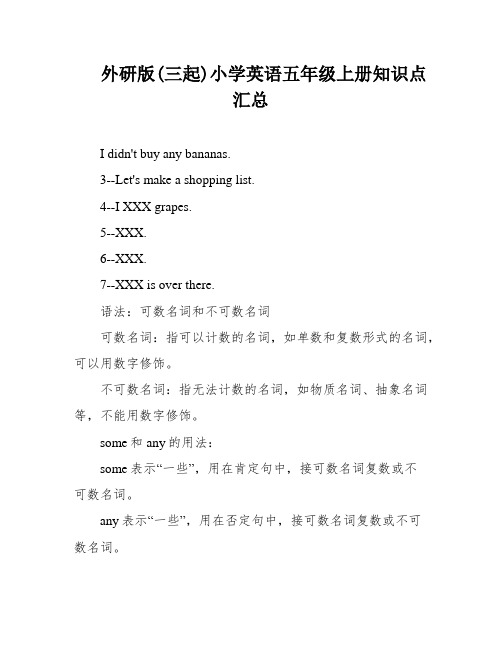
外研版(三起)小学英语五年级上册知识点汇总I didn't buy any bananas.3--Let's make a shopping list.4--I XXX grapes.5--XXX.6--XXX.7--XXX is over there.语法:可数名词和不可数名词可数名词:指可以计数的名词,如单数和复数形式的名词,可以用数字修饰。
不可数名词:指无法计数的名词,如物质名词、抽象名词等,不能用数字修饰。
some和any的用法:some表示“一些”,用在肯定句中,接可数名词复数或不可数名词。
any表示“一些”,用在否定句中,接可数名词复数或不可数名词。
a lot of和lots of都表示“许多”,接可数名词复数或不可数名词。
XXX.How much cheese did you buy?XXX.XXX word to a general XXX words are: what。
who。
whose。
why。
how。
where。
and when.Phrases:1.At the XXX2.Visit lots of places3.XXX4.Have a good day5.One hour and twenty minutes6.The Great Wall7.At ten o'clock8.XXX9.Past XXX: tell-told。
go-went。
take-took。
have-hadXXX:1.Where did you go?We went to the British Museum.2.How did you go to these places?We went by bus.3.What did you do at the weekend?4.They arrived there at ten o'clock.5.Da Ming took a photo of his father.Phrases:1.Buy sth for sb = buy sb sth2.A pair of + plural noun3.Want to do4.Past XXX: buy-bought。
外研版(一起) 小学英语五年级复习提纲

外研(一起)五年级Module 1 知识汇总一、词汇bench(长凳) playground(操场,运动场) for(达,计)different(不同的) then(那么,就)二、习惯搭配三、重点句型:1. 描述某处有某人/某物的句型:There is + 可数名词单数/不可数名词+ 其他.There are + 可数名词复数+ 其他.eg: 1. There is a bird on the tree.2. There are some books in the schoolbag.2. 描述某处以前没有某物的句型:There wasn’t + 可数名词单数/不可数名词+ 其他+ before. There weren’t + 可数名词复数+ 其他+ before.eg: 1. There wasn’t a river here before.2. There weren’t any benches in this park before.外研(一起)五年级Module 2 知识汇总一、词汇heavy(重的) let(允许,让) sell(卖,销售) sometimes(有时)二、习惯搭配三、常用表达:四、重点句型:描述物品的特征:The / This / That + 物品名称+ is + 形容词.eg: 1. This supermarket is big.2. That apple is red.外研(一起)五年级Module 3 知识汇总一、词汇名词:Halloween(万圣节前夕)Easter(复活节)festival(节日)mask(面具)neighbour(邻居)night(夜晚,夜间)chick(小鸡)chocolate(巧克力)其他:give(给,送) scary(吓人的,可怕的)二、习惯搭配三、惯用表达:四、重点句型:1. 介绍“今天是某个节日”的句型:T oday is +节日.eg: T oday is Christmas.2. 描述“某个节日在什么季节”的句型:节日+ is in +季节.eg: Halloween is in winter.外研(一起)五年级Module 4 知识汇总一、单词1. stories (s tory的复数形式)故事2. invitation 请帖3. November 十一月4. from (表示时间)从……起5. to 直到6. reply 回答,回复二、习惯搭配1. tidy up 收拾,整理2. my birthday party 我的生日聚会3. have lunch 吃午餐4. have a birthday cake 吃生日蛋糕5. after lunch 午餐后6. in the river 在河里7. see a film 看电影 8. tell stories 讲故事9. at the weekend 在周末10. on Saturday 在星期六11. make a birthday cake 做一个生日蛋糕三、惯用表达1. Oh yes! 哦,好的!四、重点句型1. We are going to + 动词原形(+其他).eg: We’re going to have lunch together. 我们打算一起吃午餐。
全]外研版(三起)小学英语五年级上册知识点归纳总结
![全]外研版(三起)小学英语五年级上册知识点归纳总结](https://img.taocdn.com/s3/m/c99ded71326c1eb91a37f111f18583d048640f70.png)
全]外研版(三起)小学英语五年级上册知识点归纳总结Module 1In Module 1.XXX。
vocabulary。
fixed phrases。
and XXX.Firstly。
XXX。
such as /iː/ for "Chinese" and "ear"。
/ɪ/ for "it" and "pig"。
and /æ/ for "cat" and "apple".Secondly。
we learned some new words。
including "met" (past tense of "meet")。
"wait"。
"dropped" (past tense of "drop")。
"finish"。
"ran" (past tense of "run")。
"send"。
"ground"。
"ice cream"。
"email"。
"above"。
"those"。
and "us".Thirdly。
XXX phrases。
such as "come back"。
"hurry up"。
"live in"。
"go to the park"。
"go home"。
"by bus"。
"wait for"。
and "last Sunday".Fourthly。
外研版五年级上册英语复习计划
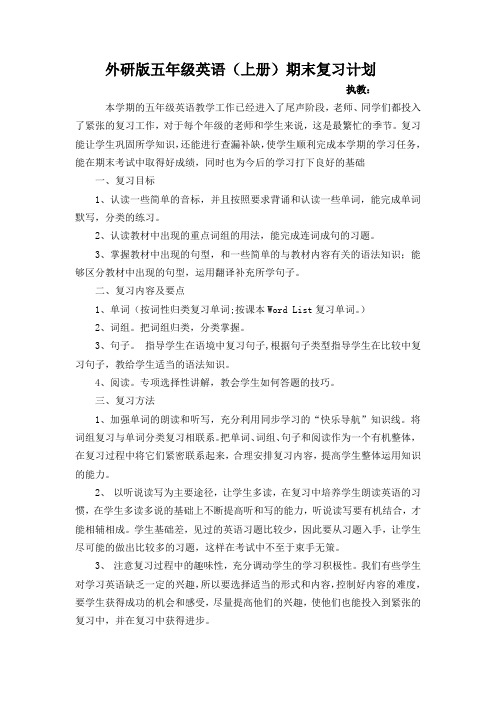
外研版五年级英语(上册)期末复习计划执教:本学期的五年级英语教学工作已经进入了尾声阶段,老师、同学们都投入了紧张的复习工作,对于每个年级的老师和学生来说,这是最繁忙的季节。
复习能让学生巩固所学知识,还能进行查漏补缺,使学生顺利完成本学期的学习任务,能在期末考试中取得好成绩,同时也为今后的学习打下良好的基础一、复习目标1、认读一些简单的音标,并且按照要求背诵和认读一些单词,能完成单词默写,分类的练习。
2、认读教材中出现的重点词组的用法,能完成连词成句的习题。
3、掌握教材中出现的句型,和一些简单的与教材内容有关的语法知识;能够区分教材中出现的句型,运用翻译补充所学句子。
二、复习内容及要点1、单词(按词性归类复习单词;按课本Word List复习单词。
)2、词组。
把词组归类,分类掌握。
3、句子。
指导学生在语境中复习句子,根据句子类型指导学生在比较中复习句子,教给学生适当的语法知识。
4、阅读。
专项选择性讲解,教会学生如何答题的技巧。
三、复习方法1、加强单词的朗读和听写,充分利用同步学习的“快乐导航”知识线。
将词组复习与单词分类复习相联系。
把单词、词组、句子和阅读作为一个有机整体,在复习过程中将它们紧密联系起来,合理安排复习内容,提高学生整体运用知识的能力。
2、以听说读写为主要途径,让学生多读,在复习中培养学生朗读英语的习惯,在学生多读多说的基础上不断提高听和写的能力,听说读写要有机结合,才能相辅相成。
学生基础差,见过的英语习题比较少,因此要从习题入手,让学生尽可能的做出比较多的习题,这样在考试中不至于束手无策。
3、注意复习过程中的趣味性,充分调动学生的学习积极性。
我们有些学生对学习英语缺乏一定的兴趣,所以要选择适当的形式和内容,控制好内容的难度,要学生获得成功的机会和感受,尽量提高他们的兴趣,使他们也能投入到紧张的复习中,并在复习中获得进步。
4、注意因材施教,采用分层分类教育,帮助不同层次的学生获得不同的提高和收获。
外研社小学英语五年级上学期复习提纲(整理编辑完美打印版)_百
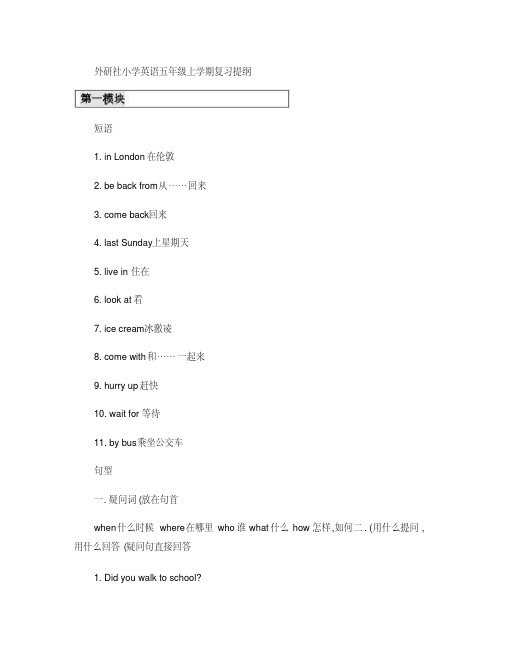
外研社小学英语五年级上学期复习提纲短语1. in London 在伦敦2. be back from 从……回来3. come back 回来4. last Sunday 上星期天5. live in住在6. look at 看7. ice cream 冰激凌8. come with 和……一起来9. hurry up 赶快10. wait for 等待11. by bus 乘坐公交车句型一. 疑问词(放在句首when什么时候where在哪里who谁what什么how怎样,如何二. (用什么提问,用什么回答(疑问句直接回答1. Did you walk to school?Yes, I did. No, I didn’t.2. Did they go home by bike?Yes, they did. No, they didn’t.3. When did you come back with Sam?I came back with Sam yesterday.三. with 加某人放在句子后面,表示和谁一起。
如:I went to school with Sam.短语1. shopping list 购物单2. how many 多少(后面加可数名词复数3. how much 多少(后面加不可数名词4. half a kilo 半公斤5. make a list 做一个单子6. one kilo of noodles 一公斤面条句型1. how many +可数名词+do you want?你想要多少……呢?对可数名词的数量提问。
2. how much +不可数名词+ do you want? 你想要多少……呢?对不可数名词的数量提问。
你喜欢……吗?3.Do you like ……?Yes, I do. No, I don’t.短语1. at the weekend 在周末2. lots of 许多(等于a lot of3. the British Museum 大英博物馆4. Big Ben 大本钟5. the London Eye 伦敦眼6. like …best最喜欢……在10点7. at ten o’clock8. take photos of 拍照9. by bus 乘坐公共汽车10. the Great Wall 长城句型1.What did you do at the weekend?你周末干了什么?2.Where did you go?你去了哪里?Where 是对地点的提问,回答用表示地点的词回答。
(外研版)小学英语五年级上册总复习

(外研版)小学英语五年级上册总复习一、单词分类1 职业(jobs)舞蹈演员dancer 司机driver 教师teacher 学生student 医生doctor 护士nurse 农民farmer 歌唱家singer 作家writer 男演员actor 女演员actress 电视台记者TV reporter (男)警察policeman 清洁工cleaner 售货员assistant (女)警察policewoman 画家artist2人体(body)foot脚 head头face脸hair头发nose鼻子 mouth嘴eye眼睛 ear耳朵 arm手臂 hand手 finger手指 leg腿 tail尾巴3乐器(Musical Instruments)violin小提琴piano 钢琴 flute 笛子 drum鼓 zither 古筝 erhu 二胡 guitar吉他4衣服(clothes)jacket夹克衫 shirt衬衫 T-shirt丅恤衫skirt短裙子 dress连衣裙jeans牛仔裤 pants长裤 socks袜子 shoes鞋子 sweater毛衣coat上衣raincoat雨衣 shorts短裤 sneakers网球鞋 slippers拖鞋sandals凉鞋boots靴子 hat(有沿的)帽子cap便帽 sunglasses太阳镜tie领带 scarf围巾 gloves手套trousers裤子 cloth布5国家(countries)China/PRC中国America/USA美国 UK联合王国 England英国Canada/CAN加拿大 Australia澳大利亚Japan 日本 France法国 Germany德国6运动(sports)race赛跑 high jump跳高 long jump跳远 walk竞走 swim游泳 judo柔道 skiing滑雪 skating滑冰 boxing拳击 basketball篮球 volleyball排球 badminton羽毛球tennis网球 table tennis乒乓球 baseball棒球 wrestling摔跤 soccer足球 chess象棋7三餐(three meals)早餐breakfast 午餐lunch 晚餐 (supper)dinner8地方(places)home家classroom教室school学校 park公园library图书馆zoo动物园post office邮局garden花园 study书房playground操场 bookstore书店 farm农场police office警察局 hospital医院 cinema电影院9食品、饮料(food & drink)rice米饭bread面包 beef牛肉milk牛奶water水chicken鸡肉 biscuit饼干 soup汤fish鱼 tofu豆腐cake蛋糕 cookie曲奇pork猪肉 tea茶 jam果酱 noodles面条meat肉salad沙拉 Coke可乐 ice-cream冰淇淋juice果汁 coffee咖啡 hot dog热狗hamburger汉堡包vegetable蔬菜 fish and chips 鱼和薯片 egg蛋10颜色(colours)红red 蓝blue 黄yellow 绿green 白white 黑black 粉红pink紫purple 橙orange 棕brown 灰grey11月份(months)January (Jan.)一月份 February(Feb.) 二月份 March(Mar.) 三月份 April 四月份May五月份 June六月份 July七月份 Auguest(Aug.)八月份 Septemper(Sept.) 九月份October(Oct.) 十月份 November(Nov.)十一月 December(Dec.) 十二月12星期( week )星期一Monday 星期二Tuesday 星期三Wednesday 星期四Thursday星期五Friday 星期六Saturday 星期日Sunday 周末weekend13季节( seasons )春spring 夏summer 秋autumn (fall) 冬winter14 thing to do every day (每天做的事情)Get up 起床 go to school 去学校 do my homework 做家庭作业have breakfast 吃早餐 Have lunch 吃中餐 have dinner 吃晚餐do housework做家务 wash clothes 洗衣服 running跑步read my book 读书 play football踢足球 play basketball 打篮球watch TV看电视 go to bed 睡觉 listen to the music 听音乐help my mother 帮妈妈做家务 water the flowers浇花 Swimming 游泳15玩具(toy)Car 小汽车 train火车 plane飞机 doll 洋娃娃 bear 小熊 ball球balloon气球kite风筝jigsaw puzzle拼图游戏box盒子yo-yo溜溜球16学校课程(school subjects)science科学 Moral Education思想品德课 Social Studies社会课Chinese语文 math数学 PE体育课English英语课 Art美术 Music 音乐17动物(animals)猫cat 狗dog 猪pig 鸭duck 兔rabbit 马horse 大象elephant 蚂蚁ant 鱼fish 鸟bird 鹰eagle 鹿deer 蛇snake 老鼠mouse 熊bear 袋鼠kangaroo 猴monkey熊猫panda 狮子lion 老虎tiger 狐狸fox 斑马zebra 长颈鹿giraffe 鹅goose母鸡hen 火鸡turkay 小羊lamb 绵羊sheep 山羊goat 奶牛cow 驴donkey18.方位词:东east 西west 南south 北north19.常见的时间词:昨天yesterday, 今天today;明天tommorow, 现在now, 上周last week, 上个月last month, 去年last years,今早this morning;今晚tonight, 今年this year, 这周this week, 在周末at the weekend, 许多年前 many years ago, 三年前 three years ago,五天前five days ago, 两周前two weeks ago, 晚饭后after dinner20.疑问词:what(什么) what colour(什么颜色) what time(几点) what day(星期几) what about(怎样) how about (怎样) how(怎样) how old(年龄多大,几岁) how many(多少) how much (多少钱) who(谁) when(什么时候) whose (谁的) where(在哪里) why(为什么) which(哪一个)21.be动词am /is/ are/ was/ were22.助动词do does did23.情态动词 can/could能会 should应该 will将要二、动词的过去式不规则形式:am/is---was是 are---were是 arrive---arrived到达buy---bought 买 bring---brought带来 borrow---borrowed借出climb---climbed 攀爬 do/does---did做don’t /doesn’t ---didn’t 不 draw---drew画画 drink---drank 喝eat---ate 吃 fly---flew 放飞 find---found找到fall---fell 跌落 feel---felt 感受 forget---forgot 忘记give--- gave给 get---got 得到 have/has--- had 吃live---lived 居住 learn---learnt学习lose --- lost丢失make--- made 制作 put---put放 read---read读书ride---rode 骑(自行车) run---ran 跑 send---sent发送;寄say---said 说 sit---sat 坐 stand---stood 站•swim---swam 游泳sweep--- swept清扫speak --- spoke 说(某种语言)talk---talked谈话 take---took 带走 teach--- taught教(书)tell---told 告诉 travel--- traveled旅行 wear--- wore穿戴write---wrote写 wear---wore穿 study---studied学习hope---hoped希望 use---used使用 stay---stayed 停留show---showed 展示;表演 can---could 能;会 will---would 可以---三、反义词1.big---- small 大小2. light---- heavy 轻重3. old---- young 老幼4.old---- new 新旧5. long ---- short长短6. hot----- cold 热冷7.tall---- short高矮 8. fat---- thin胖瘦 9. good----bad 好坏10. better---worse更好的;更糟糕的 11. strong----week强弱12. happy----sad 高兴;悲伤 13. black----white黑白14. clean---dirty干净;肮脏15. hungry-----full饿,饱16. right---- wrong对错17. fast---- slow快慢18. different-----same异同 19. up----down 上下 20. left----right左右21. easy----difficult容易;困难 22. open---close 开关 23. laugh----cry 笑哭24. turn on----- turn off开关 25. yes---- no是否26. far----near远近27. many----- few多少28. bring-----take 带来;带走29 .borrow----lend借进;借出五、人称代词主格做主语;宾格做宾语;主格放谓语动词之前;宾格放谓语动词之后;如: I (I ,me) like them. wait for us .(we,us)形容词性物主代词与名词性物主代词的用法区别:形容词性物主代词+名词名词性物主代词后面不用加名词. 形容词性物主代词+名词=名词性物主代词如:It isn’t my book. Mine is here.六、常见的介词1、in /on /at/ 在------表示时间:in+年/月/季节/周 on +星期几(在星期几) at+数字(+o’clock)在几点at half past +数字(在几点半)表示地点:in +大地点(在某城市/国家)at+小地点(在某校/图书馆/超市等)arrive in Beijing 到达北京 arrive at the airport 到达机场表示位置关系: in 在------里 in the box 在盒子里on 在------上 on the desk 在书桌上2、after在------之后 after dinner 在晚饭后3、befor在------之前4、with+人(放句末)和------一起如:with my mother 和我的妈妈一起5、to+人(给某人) to+地点(到某地)6、for+名词/人称代词的宾格/动名词(ving) for 意思是:给/为了七、常见的一般疑问句1.Can you ride a bike ?你会骑自行车吗?2.Could you read or write ?你以前会读书写字吗?3.Have you got some chopsticks?你有一些筷子吗?4.Has she got a pen ?她有一支钢笔吗?5.Do you like swimming?你会游泳吗?6.Does Amy do her homework every day ?艾米每天都做她的家庭作业吗?7.Did your grandma learn English many years ago?你的祖母许多年前学过英语吗?8.Will you take your kite tommow?明天你带你的风筝去吗?9.Are you going to go to the park next week?下周你打算去公园吗?10.Is line A longer? A线更长吗?11.I think so .我认为是这样. I don’t think so.我不认为是这样.注意:can /could /will /be going to /do /does /did 后面的动词用原形一般疑问句的回答:肯定回答:Yes,人称代词+can /will/do、be动词------否定回答:No,人称代词+can’t /won’t /am not ------八、同义词parents=father and mother 父亲和母亲 parent=father or mother 父亲或母亲九、常见的特殊疑问句及回答可数名词单数变复数的不规则变化男人man—men, 女人 woman ---women, 孩子child ------children,男警察policeman—policemen ;女警察policewoman—policewomen, 老鼠mouse—mice ;脚 foot—feet, 牙齿tooth—teeth, 鱼 fish—fish ;羊sheep-sheep ;人;人们people-people, 中国人 Chinese-Chinese,日本人 Japanese-Japanese 当people后加上s时即peoples表示“民族”九.动词的各种变化形式3 以辅音字母+y结尾的;变y为i加“ed”study—— studied carry——carried worry——worried,4以元音字母+y结尾的;直接加“ed”enjoy ——enjoyed play——played5 以重读闭音节结尾的;双写最后的辅音字母+edstop—— stopped plan——planned动词原形变现在分词一般情况下直接加ing study---studying carry---carrying play-played 以不发音的字母e结尾的单词;去掉字母e;再加ingwake---waking make-making以一元一辅结尾的动词;先双写末尾的辅音字母;再加ing stop---stopping run---running swim--swimming skip--skipping以ie结尾的动词;把ie改为y ;再加ing死die---dying 躺lie---lying•十一、祈使句是英语的基本句型之一,表达说话人对对方的叮嘱、劝告、请求或命令等,往往有表示请求、命令、希望、禁止、劝告等意思.祈使句一般没有主语,实际上是省略了主语“You”.句末用感叹号或句号,用降调朗读.•肯定结构都以动词原形开头.例如:Catch the ball !接球!(句子的意思是让“你”接球)•祈使句的肯定句式有三种形式,即1)Do型(以行为动词原形开头),•例如:Sit down坐下!Stand up起立!2)Be型(以be开头),例如:Be quiet安静!3)Let型(以let开头),例如:Let me help you.•祈使句的否定结构是以“Don’t+动词原形”开头.例如:Don’t go there,please.请别去那儿.Don’t be late.不要迟到.•let’s go and fly it.让我们去放风筝吧!•Let’s=Let us 意为“让我们”•Let’s与Let us 的区别:let’s 包括说话人自己;let us 不包括说话人.•let’s go to the park.•let us go to the park.•Let +人称代词的宾格/人的名字•如:let me let him let them let us let Sam•表示提建议:Let sb do sth 让某人做某事吧!•回答:OK. 好的./ All right 好吧./ Sure .当然可以.•如果你对对方的提议表示赞美;你还可以回答:Great!好极了!或Good idea!好主意十二、存在句There be---. 某处有某物.Be there ------? 某处有某物吗?现在的有:单数:there is +可数名词单数/不可数名词复数:there are +可数名词复数(名词+s)过去的有:单数:there was +可数名词单数/不可数名词复数:there were +可数名词复数(名词+s)There be 句型遵循就近原则.如:There is a pen and two books.There are two books and a pen.(某人拥有某物:主语+have got /has got +名词)词性转换:1.名词与代词的转换Amy =she Daming =he Sam and Daming= they the book = it如:Daming is a Chinese.=He is a Chinese.I like these dresses.=I like them.2.指示代词与人称代词及名词的转换 this/that =it those/these=they如:That’s m y T-shirt .=It’s my T-shirt. that =it =T-shirt This is a monkey.=It is a monkey . this =it =monkeyThose are my books.=They are my books. Those=they =books3.名词所有格与物主代词的转换如:Lingling’s =her/herseg. Lingling’s T-shirt is clean.=Her T-shirt is clean.=Hers is clean.4.地点名词与地点副词的转换地点名词=here这里/there 那里如:Lingling and Amy went to the Great Wall at the weekend. They went there by bus. the Great Wall= therethe zoohere on foot. the zoo= here5.实意动词与助动词(do/does/did)的转换.如:Who took this photo? 谁拍的这张照片. Daming did.大明拍的. did =took 动词的否定常见的否定词:1.not ; 2. don’t /doesn’t / didn’t●常见的动词:Be动词/ 助动词/ 情态动词/实义动词●Be动词:am is are was were●助动词: do does did have has will●情态动词:can need will•动词肯定形式变否定形式:• 1. Be动词/ 助动词/ 情态动词+not• 2. don’t / doesn’t/ didn’t +实义动词原型•如: I was two then.•I was not two then.•I liked shorts.•I didn’t like shorts.•I don’t want shorts.•Don’t argue.常见的特殊疑问词:序号特殊疑问词意思用法1 Who谁问人2 Where 在哪里问地点3 What 做什么问物品名称/职业4 How 怎么做(表示方式)问身体健康状况问人的特征问交通方式5 Why 为什么问原因用Because 回答6 Whose 谁的问某人的人/物用形容词性物主代词(my/your)或xxx’s 回答7 How old 多少岁问年龄8 How many 多少问数量9 What colour 什么颜色问颜色10 What time / When 什么时候问时间问某人做什么事情11 What ---doing? 正在做什么12 What ---do ? 做什么问某人做什么•How 开头的问句•How +be +主语?表示问身体状况或某人的特征.•回答:主语+be + 形容词.•How ---go ---? 意思是:怎样去.用于问交通方式.•回答:by +交通工具./ walk /on foot.• e.g:•1)How are you ? 你好吗?•I’m fine ./ I ‘m well. 我很好. (fine =well 身体好)•2)How is Daming ? 大明这个人怎样?•He is clever. 他很聪明.•3)How do you go to school? 你每天是怎样上学的?•I go to school by bus. 我每天坐公车上学.•I go to school on foot. 我每天步行上学.•记住:How -----?•回答有两种:1.形容词(fine/well/clever---)• 2.by +交通工具.或者回答walk /on foot.What 开头的问句•(1)What + be +主语?这个是什么?•回答:主语+ be+ 名称.•(2)What ---do ---? 做什么?•回答:动词短语.• e.g:1.What ‘s this ? 这是什么?It is a robot .这是一个机器人./他是一个机器人.2. What do you do every day? 你每天都做什么?I do my homework every day .我每天都做作业.3. What does she do every day ?她每天做什么?She rows a boat every day . 她每天划船.4.What did you do last Sunday ? 上个星期天你做了什么?I helped my mum. 我帮助妈妈做家务.What are you doing ? 你正在做什么?I am listening to music. 我正在听音乐.5.What will you do ? 你将会做什么?I will read my book. 我将会看书.6. What are you going to do ?你打算做什么?I am going to do my homework. 我打算做我的家庭作业.What will you do ?=What are you going to do ? 你打算做什么?will =be going to 将要;计划;打算will+动词原形be going to + 动词原形Where 开头的问句• 1.问人/物在什么位置用:•Where +be + 主语?(某人/某物在哪里?)•回答:主语+ be + 介词短语.•常用的介词有:in在------里/ on在------上/ at在/ under在------下面/ beside在------旁边/ behind 在------后面/ near在------附近/next to 在旁边/ close to靠近------ / out在外面• 2.问路:Excuse me ,where is ---?•回答:Turn left / turn right / go straight on .•Why ----? 答:Because----•Who---?答:人/人的名字•my /your / his /her /our/their+ 人•如:Who is she ? 她是谁?•She is my teacher .她是我的老师.•She is Amy . 她是Amy.•Who are they ? 他们是谁?•They are Sam’s grandparents.他们是萨姆的祖父和祖母. •Whose + 人/ 物---?(谁的---)•回答:xxx’s 或者my /your / his /her /our/their+ 人/ 物•如:Whose book is it? 这是谁的书?•回答:Amy’s 艾米的./ It’s my book .动词(V)的时态:。
外研社版三起小学英语五年级上册复习提纲__短语+句型

五年级复习提纲第一模块短语:1. in London 在伦2. be back from 从……回来3. come back 回来4. last Sunday 上星期天5. live in住在6. look at 看7. ice cream 冰激凌8. come with 与……一起来9. hurry up 赶快10. wait for 等待11. by bus 乘坐公交车12.chinese friends 中国朋友13.句型:一. 疑问词(放在句首)when什么时候where在哪里who谁what什么how怎样,如何二. (用什么提问,用什么回答)(疑问句直接回答)1.Did you walk to school? (你步行去学校么?)Yes, I did. No, I didn’t2..Did they go home by bike?(他们骑自行车去学校么?)Yes, they did.No, they didn’t.3.When did you come back with Sam?(你和sam什么时候回来?)I came back with Sam yesterday.(昨天我和sam回来的。
)4. I dropped my ice cream.三、with 加某人放在后面。
如:I went to school with Sam.(我同sam去学校)四、过去式:come-came go-went meet-met buy-bought drop-droppedRun-ran see-saw walk-walked send(邮寄)-sent eat-ate live-lived Have-had do-did第二模块短语1. shopping list 购物单2. how many多少(可数名词复数)4. half a kilo 半公斤3.how much 多少(不可数名词) 6. one kilo of noodles 一公斤面条5.make a list 做一个清单7、go to the supermarket 去超市8、the first thing 第一项9、five bottles 五瓶10、here you are给你11.what's next?下一项是什么?12.all right 好吧句型1. how many +可数名词+do you want?你想要多少……呢?对可数名词的数量提问。
- 1、下载文档前请自行甄别文档内容的完整性,平台不提供额外的编辑、内容补充、找答案等附加服务。
- 2、"仅部分预览"的文档,不可在线预览部分如存在完整性等问题,可反馈申请退款(可完整预览的文档不适用该条件!)。
- 3、如文档侵犯您的权益,请联系客服反馈,我们会尽快为您处理(人工客服工作时间:9:00-18:30)。
一、(外研版)小学英语五年级上册总复习二、单词分类1 职业(jobs)舞蹈演员dancer 司机driver 教师teacher 学生student 医生doctor 护士nurse 农民farmer 歌唱家singer 作家writer 男演员actor 女演员actress 电视台记者TV reporter (男)警察policeman 清洁工cleaner 售货员assistant (女)警察policewoman 画家artist2人体(body)foot脚 head头face脸hair头发nose鼻子 mouth嘴eye眼睛 ear耳朵 arm手臂 hand手 finger手指 leg腿 tail尾巴3乐器(Musical Instruments)violin小提琴piano 钢琴 flute 笛子 drum鼓 zither 古筝 erhu 二胡 guitar吉他4衣服(clothes)jacket夹克衫 shirt衬衫 T-shirt丅恤衫skirt短裙子 dress连衣裙jeans牛仔裤 pants长裤 socks袜子 shoes鞋子 sweater毛衣coat上衣raincoat雨衣 shorts短裤 sneakers网球鞋 slippers拖鞋sandals凉鞋boots靴子 hat(有沿的)帽子cap便帽 sunglasses太阳镜tie领带 scarf围巾 gloves手套trousers裤子 cloth布5国家(countries)China/PRC中国America/USA美国 UK联合王国 England英国Canada/CAN加拿大 Australia澳大利亚Japan 日本 France法国 Germany德国6运动(sports)race赛跑 high jump跳高 long jump跳远 walk竞走 swim游泳 judo柔道 skiing滑雪 skating滑冰 boxing拳击 basketball篮球 volleyball排球 badminton羽毛球tennis网球 table tennis乒乓球 baseball棒球 wrestling摔跤 soccer足球 chess象棋7三餐(three meals)早餐breakfast 午餐lunch 晚餐 (supper)dinner8地方(places)home家classroom教室school学校 park公园library图书馆zoo动物园post office邮局garden花园 study书房playground操场 bookstore书店 farm农场police office警察局 hospital医院 cinema电影院9食品、饮料(food & drink)rice米饭bread面包 beef牛肉milk牛奶water水chicken鸡肉 biscuit饼干 soup汤fish鱼 tofu豆腐cake蛋糕 cookie曲奇pork猪肉 tea茶 jam果酱 noodles面条meat肉salad沙拉 Coke可乐 ice-cream冰淇淋juice果汁 coffee咖啡 hot dog热狗hamburger汉堡包vegetable蔬菜 fish and chips 鱼和薯片 egg蛋10颜色(colours)红red 蓝blue 黄yellow 绿green 白white 黑black 粉红pink紫purple 橙orange 棕brown 灰grey11月份(months)January (Jan.)一月份 February(Feb.) 二月份 March(Mar.) 三月份 April 四月份May五月份 June六月份 July七月份 Auguest(Aug.)八月份 Septemper(Sept.) 九月份October(Oct.) 十月份 November(Nov.)十一月 December(Dec.) 十二月12星期( week )星期一Monday 星期二Tuesday 星期三Wednesday 星期四Thursday星期五Friday 星期六Saturday 星期日Sunday 周末weekend13季节( seasons )春spring 夏summer 秋autumn (fall) 冬winter14 thing to do every day (每天做的事情)Get up 起床 go to school 去学校 do my homework 做家庭作业have breakfast 吃早餐 Have lunch 吃中餐 have dinner 吃晚餐do housework做家务 wash clothes 洗衣服 running跑步read my book 读书 play football踢足球 play basketball 打篮球watch TV看电视 go to bed 睡觉 listen to the music 听音乐help my mother 帮妈妈做家务 water the flowers浇花 Swimming 游泳15玩具(toy)Car 小汽车 train火车 plane飞机 doll 洋娃娃 bear 小熊 ball球balloon气球kite风筝jigsaw puzzle拼图游戏box盒子yo-yo溜溜球16学校课程(school subjects)science科学 Moral Education思想品德课 Social Studies社会课Chinese语文 math数学 PE体育课English英语课 Art美术 Music 音乐17动物(animals)猫cat 狗dog 猪pig 鸭duck 兔rabbit 马horse 大象elephant 蚂蚁ant 鱼fish 鸟bird 鹰eagle 鹿deer 蛇snake 老鼠mouse 熊bear 袋鼠kangaroo 猴monkey熊猫panda 狮子lion 老虎tiger 狐狸fox 斑马zebra 长颈鹿giraffe 鹅goose母鸡hen 火鸡turkay 小羊lamb 绵羊sheep 山羊goat 奶牛cow 驴donkey18.方位词:东east 西west 南south 北north19.常见的时间词:昨天yesterday, 今天today,明天tommorow, 现在now, 上周last week, 上个月last month, 去年last years,今早this morning,今晚tonight, 今年this year, 这周this week,在周末at the weekend, 许多年前 many years ago, 三年前 three years ago,五天前five days ago, 两周前two weeks ago, 晚饭后after dinner20.疑问词:what(什么) what colour(什么颜色) what time(几点) what day(星期几) what about(怎样) how about (怎样) how(怎样) how old(年龄多大,几岁) how many(多少) how much (多少钱) who(谁) when(什么时候) whose (谁的) where(在哪里) why(为什么) which(哪一个)21.be动词am /is/ are/ was/ were22.助动词do does did23.情态动词 can/could能会 should应该 will将要二、动词的过去式不规则形式:am/is---was是 are---were是 arrive---arrived到达buy---bought 买 bring---brought带来 borrow---borrowed借出climb---climbed 攀爬 do/does---did做don’t /doesn’t ---didn’t 不 draw---drew画画 drink---drank 喝eat---ate 吃 fly---flew 放飞 find---found找到fall---fell 跌落 feel---felt 感受 forget---forgot 忘记give--- gave给 get---got 得到 have/has--- had 吃live---lived 居住 learn---learnt学习lose --- lost丢失make--- made 制作 put---put放 read---read读书ride---rode 骑(自行车) run---ran 跑 send---sent发送,寄say---said 说 sit---sat 坐 stand---stood 站•swim---swam 游泳sweep--- swept清扫speak --- spoke 说(某种语言)talk---talked谈话 take---took 带走 teach--- taught教(书)tell---told 告诉 travel--- traveled旅行 wear--- wore穿戴write---wrote写 wear---wore穿 study---studied学习hope---hoped希望 use---used使用 stay---stayed 停留show---showed 展示,表演 can---could 能,会 will---would 可以---三、反义词1.big---- small 大小2. light---- heavy 轻重3. old---- young 老幼4.old---- new 新旧5. long ---- short长短6. hot----- cold 热冷7.tall---- short高矮 8. fat---- thin胖瘦 9. good----bad 好坏10. better---worse更好的,更糟糕的 11. strong----week强弱12. happy----sad 高兴,悲伤 13. black----white黑白14. clean---dirty干净,肮脏15. hungry-----full饿,饱16. right---- wrong对错17. fast---- slow快慢18. different-----same异同 19. up----down 上下 20. left----right左右21. easy----difficult容易,困难 22. open---close 开关 23. laugh----cry 笑哭24. turn on----- turn off开关 25. yes---- no是否26. far----near远近27. many----- few多少28. bring-----take 带来,带走29 .borrow----lend借进,借出主格做主语,宾格做宾语,主格放谓语动词之前,宾格放谓语动词之后;如: I (I ,me) like them. wait for us .(we,us)形容词性物主代词与名词性物主代词的用法区别:形容词性物主代词+名词名词性物主代词后面不用加名词。
